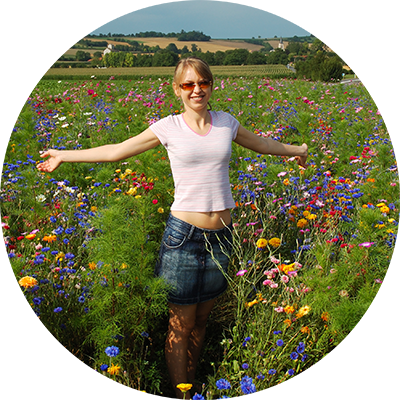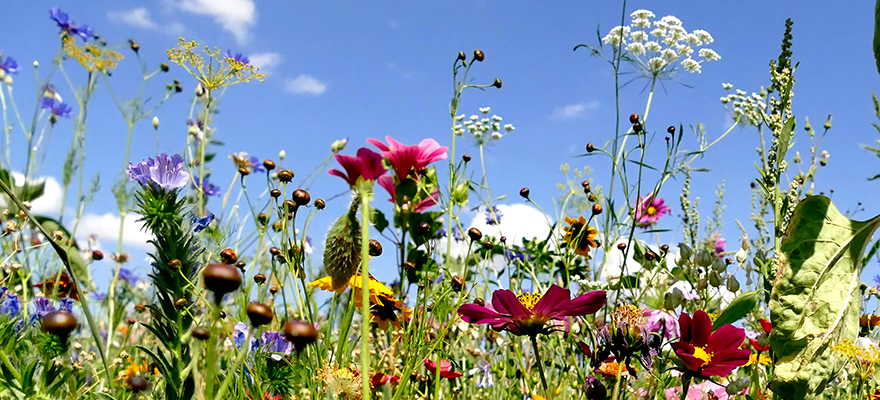The hay fever season is starting again. For many people with hay fever and pollen allergies, reaching for medication is routine. However, the availability of proven hay fever medication is currently limited. This raises the question: what can alternative medicine such as acupuncture or osteopathy do?
What is hay fever?
Hay fever is a common form of allergy that is triggered by hypersensitivity of the immune system to certain plant pollen. The pollen contains proteins that are recognized by the body as foreign and dangerous. This leads to a defensive reaction that causes typical symptoms such as sneezing, runny nose, itching and watery eyes. Coughing and skin rashes are also possible. The symptoms can vary depending on the pollen count and can range from mild to very severe.
Hay fever mainly occurs in spring and summer, i.e. during the main flowering period of the allergy-causing plants. The most common pollen allergens include grasses, birch, hazel, alder and mugwort. An allergy test by a doctor can clarify which pollen triggers the allergy.
There are various ways to alleviate the symptoms and prevent complications. These include medication such as antihistamines or nasal sprays as well as hyposensitization (specific immunotherapy), in which the body is gradually accustomed to the allergen.

How do allergies develop?
Allergies are overreactions of the immune system to certain substances that are normally harmless. These substances are called allergens and can be, for example, pollen, animal hair, food or medication. When a person comes into contact with an allergen, their immune system produces antibodies against it. Upon renewed contact with the substance, inflammatory mediators are released, which lead to typical allergy symptoms such as a runny nose, itching, sneezing or a skin rash.
The causes of allergies are not yet fully understood, but there are a number of factors that can increase the risk. These include genetic predisposition, environmental pollution, hygiene and lifestyle.
What weakens the immune system?
To strengthen the immune system, factors that can weaken it should be avoided. This includes
– Lack of sleep: If we sleep too little, this can affect our metabolism and our immune cells. Lack of sleep can increase the risk of infections.
– Stress: Chronic stress caused by overwork or traumatic experiences can lead to a drop in certain immune cells. Stress hormones such as cortisol can also promote inflammation and delay wound healing.
– Cold: If the body is cold, the body’s defenses are slowed down. Blood flow to the mucous membranes is reduced and the cilia in the airways work less effectively. This makes it easier for pathogens to enter the body.
– Alcohol: Alcohol can disrupt the function of the immune cells and reduce their number. It also damages the mucous membranes in the mouth and throat and makes them more susceptible to infections.
– Smoking: Smoking clouds the immune system on several levels. It damages the cilia in the airways, increases oxidative stress in the body and weakens antibody production.
– Vitamin deficiency: Vitamins are important building blocks for the immune system. A lack of vitamins such as vitamin C, D or B12 can reduce the body’s resistance and lead to increased susceptibility to infections.
– Medication: Some medications can suppress or influence the immune system, for example immunosuppressants, antibiotics or cortisone.
Tips for hay fever sufferers
- Steam baths with saline solution or essential oils such as eucalyptus, fennel or dill moisturize the nasal mucosa and loosen the mucus. You can dissolve one to two teaspoons of salt in a liter of boiling water and inhale for ten minutes. Or you can put a few drops of oil in a bowl of hot water and inhale the steam.
- Nasal rinses with saline solution flush the pollen away from the nose and thus reduce the itching and inflammation. You can use a nasal douche from the pharmacy or make your own solution (dissolve a teaspoon of salt in a quarter of a liter of lukewarm water). Rinsing should be done twice a day if possible.
- Moist eye masks or cold compresses on the eyes soothe irritated eyes and relieve burning and tearing. You can use a damp cloth or cotton pads and place them on your closed eyes for about ten minutes.
- Pollen protection in everyday life: To minimize contact with pollen, you should take a shower in the evening and wash your hair to wash out the pollen. You should also not take your clothes off or leave them to dry in the bedroom. If you are out and about, you can wear sunglasses to protect your eyes. And if you are driving, you should keep the windows closed.
- Vitamin-rich diet: A healthy diet strengthens the immune system and can therefore alleviate allergy symptoms. Vitamin C (in citrus fruits, kiwis or peppers), vitamin E (in nuts, seeds or vegetable oils) and omega-3 fatty acids (in linseed or walnuts) are particularly important. These substances have an anti-inflammatory and antioxidant effect. On the other hand, avoid foods that contain or can release histamine, such as white wine, cheese or salami.
- Drink plenty of fluids: Sufficient fluids help to keep the mucous membranes moist and thin the mucus. Drink at least two liters of water or unsweetened tea a day.
These home remedies can help you get through the hay fever season better. However, if you have severe symptoms or they do not get better, you should consult a doctor.
Sport and hay fever: what you should bear in mind
The airways suffer particularly with hay fever. Do you have to avoid sport if you have a runny nose and breathing difficulties? No, because exercise can actually help to alleviate the allergic reaction and strengthen the airways. However, you should follow a few tips to minimize contact with pollen and make your training more pleasant.
1. inform yourself about the pollen count
There are various online portals that show you how high the pollen count is in your region and which types of pollen are currently active. If you know which pollen you are allergic to, you can plan your sports activities accordingly. Avoid days with a high pollen count or do your sport at home or in the gym.
2. choose the right time of day
The pollen count varies depending on the time of day. It is generally lowest early in the morning and late in the evening. These are therefore good times for outdoor sports such as running, cycling or hiking. You should also keep an eye on the weather: More pollen is on the move when it’s windy and dry than when it’s raining or calm.
3. focus on endurance sports
Endurance sports such as swimming, jogging or cycling strengthen your lungs and respiratory muscles and can therefore alleviate the symptoms of hay fever. Start with low intensity and increase slowly. It is best to start your training at times when there is little pollen count so that you can get used to the strain gently.
4. stay flexible
If you suffer from hay fever, you may not always be able to keep to your training schedule. Your performance may fluctuate and on some days it may simply not be possible to train. Listen to your body and adapt your training to your condition.
Hay fever during pregnancy
Hay fever can be particularly troublesome during pregnancy, as the mucous membranes react more sensitively and some medications cannot be taken. To relieve hay fever during pregnancy, you should consider the following:
- Avoid contact with pollen as much as possible. Close the windows and doors, wear sunglasses and wash your hair regularly.
- Tell your doctor about your allergy. Some medications for hay fever can be used during pregnancy, but others cannot!
- Use alternative methods to alleviate the symptoms, such as nasal rinses with salt water, inhalations with camomile or peppermint.
- Strengthen your immune system with a balanced diet, sufficient fluids and exercise.
Although hay fever during pregnancy is unpleasant, it is usually harmless for mother and child. However, if you have severe symptoms or are unsure, always consult a doctor.
Acupuncture for hay fever: an alternative treatment method
Acupuncture is a branch of traditional Chinese medicine (TCM) that is based on the concept of Qi. Qi is the life energy that flows through energy pathways (meridians) in the body. If the Qi is disturbed, illnesses arise. Acupuncture aims to restore the balance of Qi by inserting fine needles at specific points on the meridians.
Acupuncture can help with hay fever by stimulating self-regulating processes in the body and strengthening the immune system. It can also inhibit inflammation and promote blood circulation.
There are various forms of acupuncture for hay fever. Classical Chinese acupuncture aims to eliminate the “wind”, which is considered to be the cause of hay fever.
To achieve optimum success, acupuncture should be started early, preferably before the start of the pollen season. The number of sessions depends on the individual case, but several treatments are usually necessary. Acupuncture is generally well tolerated and has few side effects.
Acupuncture should be used with caution in pregnant women.
How can osteopathy help with hay fever?
Osteopathy can help to alleviate the symptoms of hay fever, such as sneezing, itching or nasal congestion.
Manual stimulation of the tissue can also improve the function of the immune system by stimulating circulation in the tissue.
This is done using gentle manual techniques that act on the skull, face, neck and chest. There are some techniques that experience has shown to have a positive effect. These techniques are also very effective for pregnant women.
Conclusion
If you suffer from hay fever and want to be independent of medication, there are a number of ways to alleviate the symptoms or – according to the traditional view – to combat the causes or developmental processes of hay fever. Seek advice from an alternative practitioner or naturopathic doctor about individual treatment options. You are also welcome to book a consultation with me.
(*) The therapies mentioned on this website are procedures from the wealth of experience of alternative & naturopathy and osteopathy. Although these therapies are used all over the world by countless doctors and therapists, there are often no or only a few scientifically recognized studies that prove their effectiveness in the conventional medical sense. For legal reasons, it is therefore not permitted to make any statements about the effectiveness of these therapies and procedures.
I will be happy to provide you with more information or answer any questions you may have during a consultation.

